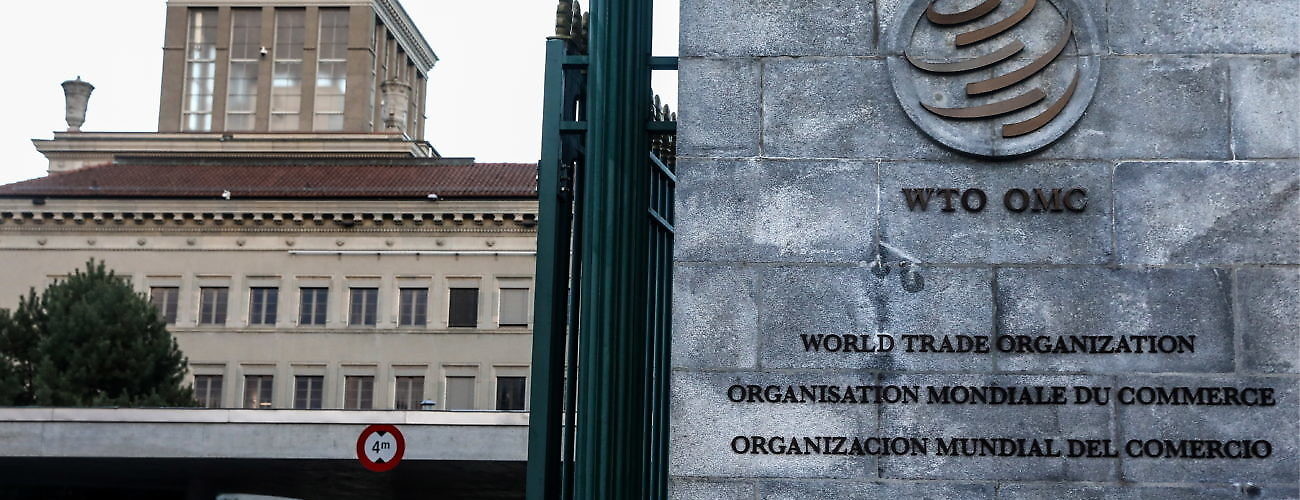The entrance to the headquarters of the World Trade Organization (WTO) in Geneva, Switzerland. (Valery SharifulinTASS via Getty Images)
As it enters its twenty-fifth year of existence, the World Trade Organization (WTO) is facing its biggest crisis. Who or what are the culprits? Some say it is the rise of protectionism, especially the unilateralism of the United States. Others say it is the proliferation of regional trade agreements, especially the mega-regionals. But increasingly more commentators are pointing to China as the biggest threat to the multilateral trading system.
There seems to be an emerging consensus, especially among the big players, that the existing WTO rules are inadequate for dealing with China. This is prompting calls for new rules to cope with the challenges brought by China’s unique economic system, with its heavy reliance on state-owned enterprises (SOEs) and government subsidies.
The idea of China’s uniqueness is not entirely new. When China sought entry to the General Agreement on Tariffs and Trade (GATT) thirty years ago, Douglas Newkirk—a senior US trade official—famously stated that “the GATT was not written with a socialist market economy in mind.” When the Doha Round stalled ten years ago, Aaditya Mattoo and Arvind Subramanian suggested that one way to break the deadlock would be launching a “China round of multilateral trade negotiations.”
This approach is highly problematic. To start with, you cannot just change the rules of the game every time you start to lose. This is not only far from fair play, but it is also very risky—especially when dealing with an emerging power like China. Since joining the WTO, China has been learning very fast from the other major players. If, as some members have hoped, the WTO changed its rules just to deal with China, this would set a dangerous precedent that China would almost certainly use itself one day.
Moreover, even if some WTO members created new China-specific rules, how could they persuade China to accept them? Unlike thirty years ago, China is not seeking accession and the other WTO members have no leverage available. Instead, in accordance with the decision-making rule of the WTO, China now has the power to block any new rule by simply refusing to join the consensus.
Does this mean that there is no way to deal with the challenges raised by China’s state capitalism?
Rather than seeking to rewrite the rules completely, WTO members should review existing rule books, including both the general WTO rules and China’s accession commitments. There are a number of China-specific rules that have long been overlooked, such as China’s commitments to ensure SOEs and state-invested enterprises (SIEs) “make purchases and sales based solely on commercial considerations” and that prices for traded goods and services in every sector should “be determined by market forces.”
Broadly speaking, these rules may be interpreted in ways that not only prevent the Chinese government from intervening in the market, but also ensure that such interventions would not be implemented through SOEs or SIEs. This can help address the market distortions caused by state intervention.
Most importantly, the special rule on subsidies in Section 15(b) of China’s WTO Accession Protocol, coupled with the existing WTO rules on subsidies, provide a good defense against the problems created by China’s unique economic model.
So why have these rules seen little usage in the eighteen years since China’s accession? This is due to three misconceptions.
The first is that countervailing actions are impossible without sufficient information on the subsidy programs in China. This can be remedied by the open-ended language of “special difficulties” in Section 15(b). This allows investigating authorities of the importing countries to use alternative methodologies for identifying and measuring subsidy benefits, especially when information on subsidies is lacking, insufficient, or otherwise difficult to obtain.
The second misconception is that the WTO Appellate Body’s narrow interpretation of what constitutes a “public body” under the WTO’s Agreement on Subsidies and Countervailing Measures has made it very difficult to regulate SOEs as public bodies. This is less significant now that China has started to assign key governmental functions to many SOEs. Along with the push by the Communist Party of China to install Party Committees in SOEs and to make them the key decision-makers, it becomes much easier to find the exercise of government authority by these SOEs and government control of these firms.
The third misconception is that subsidy-countervailing actions are ineffective in practice. But studies have shown countervailing measures tend to provide much higher margins of protection compared to anti-dumping measures. Moreover, with the expiration of the non-market economy methodology at the end of 2016, the current set of inflated anti-dumping rates can no longer be sustained. This leaves countervailing measures as the only meaningful option.
In short, the real problem is not the lack of rules to tackle China’s state capitalism, but the lack of utilization of existing rules. WTO members—especially the major players—should start conducting well-coordinated countervailing investigations domestically and initiate “big, bold” cases at the WTO to challenge China’s subsidies and state intervention in the market through SOEs. This will not only help to level the playing field for non-Chinese firms, but also help China to steer its SOE reform back on the right course, as originally charted by reform pioneers like Deng Xiaoping and Jiang Zemin more than thirty years ago.
Henry Gao is Associate Professor of Law at Singapore Management University. Weihuan Zhou is Senior Lecturer in Law at UNSW Sydney and a member of the Herbert Smith Freehills China International Business and Economic Law (CIBEL) Centre. This article was originally published on East Asia Forum.





